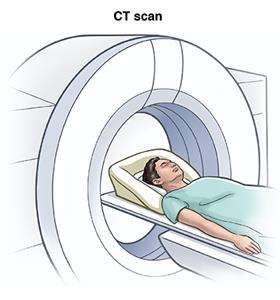A
B
C
D
E
F
G
H
I
J
K
L
M
N
O
P
Q
R
S
T
U
V
W
X
Y
Z
Click a letter to see a list of conditions beginning with that letter.
Click 'Topic Index' to return to the index for the current topic.
Click 'Library Index' to return to the listing of all topics.
Epidural Abscess
What is an epidural abscess?
An epidural abscess is an infection that forms in the space between your skull bones and your brain lining (intracranial epidural abscess). Quite often, it forms in the space between the bones of your spine and the lining membrane of your spinal cord (spinal epidural abscess).
An epidural abscess results in a pocket of pus that builds up and causes swelling. It can press against your bones and the membranes that protect your spinal cord and your brain (meninges). This swelling and the underlying infection can affect sensations and physical movement and can cause other problems. An epidural abscess needs to be treated right away.
What causes an epidural abscess?
Typically, an epidural abscess is caused by a Staphylococcus aureus bacterial infection. It could also result from a fungus or another germ circulating in your body. Much of the time, healthcare providers can't find a particular cause of the infection.
What are the risk factors for epidural abscess?
If you suffer from persistent sinus or ear infections, or have had an injury to your head, you may be more likely to develop an epidural abscess inside your skull. You're more likely to develop an epidural abscess on your spine if you have an infection in the bones of your spine or in your blood, or have had a surgical procedure on your back.
What are the symptoms of an epidural abscess?
The symptoms of an epidural abscess depend on the location of the abscess. An epidural abscess may cause these symptoms:
- Headache
- Disturbed consciousness
- Fever
- Unusual sensation throughout your body
- Problems with coordination and movement
- Trouble walking
- General weakness of the muscles in both the arms and legs that worsens
- Paralysis — being unable to move your legs or arms
- Pain in your back
- Inability to control your bowels or bladder
- Feeling nauseated or vomiting
- Feeling very tired and sluggish
How is an epidural abscess diagnosed?
A healthcare provider will ask about your medical history and symptoms. Diagnostic tests and exams may include:
- Neurological exam to look for changes in motor and sensory function, vision, coordination and balance, mental status, and in mood or behavior
- Magnetic resonance imaging (MRI) scan
- Computed tomography (CT) scan
- Tests of a fluid sample from the abscessed area to determine the cause of the infection
- Blood tests to look for germs and other signs of infection

How is an epidural abscess treated?
Typically, your healthcare provider will give you antibiotics to fight the infection that caused the abscess. A surgeon may need to drain the fluid from the abscess with a needle, to help relieve the pressure. Sometimes, your surgeon may remove it entirely. You will most likely require surgery to drain or remove the abscess if you have difficulty moving or are unable to move at all, or if you have sensation problems, such as numbness, somewhere in the body.
What are the complications of an epidural abscess?
Without treatment, serious complications can occur, such as:
- Meningitis, an infection of your meninges
- Abscess of your spinal cord itself
- Infection inside your spine or skull bones
- Long-term back pain
- Irreversible damage to your brain or nervous system, including paralysis
Once damage to your nervous system has occurred, it can be difficult to restore normal nervous system function. Untreated epidural abscess can be extremely dangerous and may result in death.
Key points
- An epidural abscess is an infection inside your skull or near your spine. It requires immediate treatment.
- Symptoms can include headache, fever, changes in consciousness, vomiting, changes in sensation, weakness, trouble moving or walking, and loss of bladder or bowel control.
- Treatment is with strong antibiotics. Surgery might be needed to drain the fluid from your abscess or to remove it completely.
Next steps
Tips to help you get the most from a visit to your healthcare provider:
- Know the reason for your visit and what you want to happen.
- Before your visit, write down questions you want answered.
- Bring someone with you to help you ask questions and remember what your provider tells you.
- At the visit, write down the name of a new diagnosis, and any new medicines, treatments, or tests. Also write down any new instructions your provider gives you.
- Know why a new medicine or treatment is prescribed, and how it will help you. Also know what the side effects are.
- Ask if your condition can be treated in other ways.
- Know why a test or procedure is recommended and what the results could mean.
- Know what to expect if you do not take the medicine or have the test or procedure.
- If you have a follow-up appointment, write down the date, time, and purpose for that visit.
- Know how you can contact your provider if you have questions.
Online Medical Reviewer:
Shelat, Amit, MD
Online Medical Reviewer:
Ziegler, Olivia, MS, PA
Date Last Reviewed:
8/1/2023
© 2000-2024 The StayWell Company, LLC. All rights reserved. This information is not intended as a substitute for professional medical care. Always follow your healthcare professional's instructions.